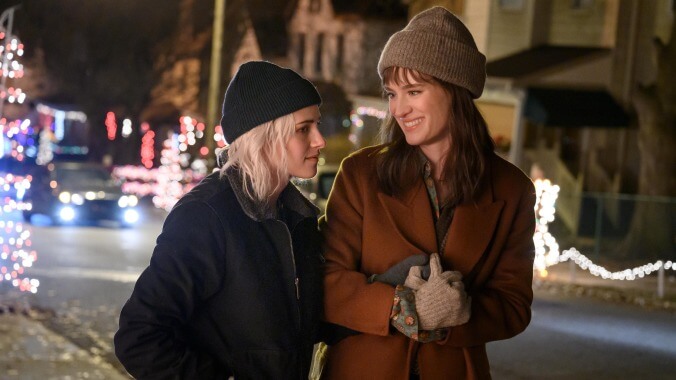Kristen Stewart celebrates the Happiest Season in a pioneering queer Christmas rom-com


Mix The Family Stone with While You Were Sleeping, add a touch of My Best Friend’s Wedding, and give the whole thing a lesbian makeover, and you’ve got Happiest Season, Hulu’s much-anticipated new holiday rom-com starring Kristen Stewart and Mackenzie Davis. If that makes the film sound a touch derivative, that’s kind of the point. Writer/director/longtime lesbian icon Clea DuVall set out to put a queer spin on the sort of comforting, feel-good holiday romances that straight audiences have been enjoying for decades. And like the similarly trailblazing teen movie Love, Simon, that means Happiest Season feels like nothing you’ve seen before and also like a lot of things you’ve seen before.
The boldest choice DuVall makes in her second feature is to skip past the flutters of first love and instead center the film around a couple in crisis. It’s not until halfway through a road trip to her parents’ house that Harper Caldwell (Davis) confesses to girlfriend Abby (Stewart) that she’s not out to her family yet. So while Abby had been planning to propose at the Caldwell family Christmas, she instead finds herself pretending to be Harper’s straight roommate. Even worse, she’s shocked to discover that her quirky, fun-loving girlfriend acts differently when she’s around her competitive, conservative family. Being back in her hometown seems to awaken Harper’s latent high school mean girl, as she starts ditching Abby to schmooze with her parents’ colleagues or grab drinks with her high-school boyfriend.
DuVall lets Harper be full-on unlikable at points, which doesn’t particularly aid the film as a romance or comedy, but does take it to some interesting dramatic places. Happiest Season is about dualities of self in a way that speaks to the specific queer experience of being in the closet, yet it’s equally relatable to anyone who feels like they become a different person around their family. Harper’s politician dad (Victor Garber) and image-focused mom (Mary Steenburgen) have slotted their three daughters into preordained roles and then subtly pitted them against one another. That leaves Harper with plenty to unpack in her relationship with her sisters, played by a characteristically neurotic Alison Brie and a characteristically wacky Mary Holland (who also co-wrote the film with DuVall).
Abby, meanwhile, gets to explore the “found family” aspect of the queer experience as she looks to sympathetic sounding boards in her best friend John (Schitt’s Creek’s Daniel Levy), who’s also gay, and Harper’s secret high-school girlfriend Riley (Aubrey Plaza). Playing one of her most “normal” characters to date, Stewart turns in an affable leading lady performance that fits somewhere between her more reserved indie work and her energetically mischievous turn in last year’s Charlie’s Angels. Though Abby doesn’t exactly seem like someone who would dazzle parents upon first meeting them, as we’re meant to believe, Stewart makes for a charmingly sheepish rom-com everywoman. She’s always comfortable on screen, even when Abby isn’t. And Stewart does her best work when she’s breezily bouncing off of Levy and Plaza, the latter of whom turns in a performance so magnetic it almost unbalances the whole film.
Happiest Season’s biggest stumbling block is that its opening scenes don’t do enough to establish that same level of connection between Stewart and Davis. Abby and Harper’s early bond is fueled more by generic platitudes than by the believable specifics of a serious year-long relationship, which means Happiest Season requires a big buy-in from its audience when it comes to investing in the film’s central couple as they head toward a rough patch. The fact that Stewart and Davis are beautiful, charismatic, and wear the hell out of some impeccable clothing (courtesy of costume designer Kathleen Felix-Hager) sort of papers over that fundamental weakness—as does the sheer thrill of seeing a same-sex couple placed center stage in this kind of cheery studio rom-com. But the actual romance portion of this holiday romance is somewhat uneven.
Instead, Happiest Season bounces back and forth between being a fascinating character drama and a zippily cheesy comedy. Not all the jokes land, but the film gets major points for pulling off a surprisingly funny runner about Abby’s dead parents. Steenburgen and Holland consistently wring laughs from even the most mundane lines through sheer force of off-kilter delivery. And Levy gets to put his dramatic chops to use in a lovely climatic monologue about the coming-out experience. If Happiest Season often feels like it’s trying to be several movies at once, there’s something to be said for the value of having too many ideas rather than too few—particularly in a genre known for its well-worn formulas. It’s possible to imagine a much more risk-taking movie than the one DuVall has made. But before a film can break the queer holiday rom-com mold, someone has to set it up first. And Happiest Season is a welcome starting point.